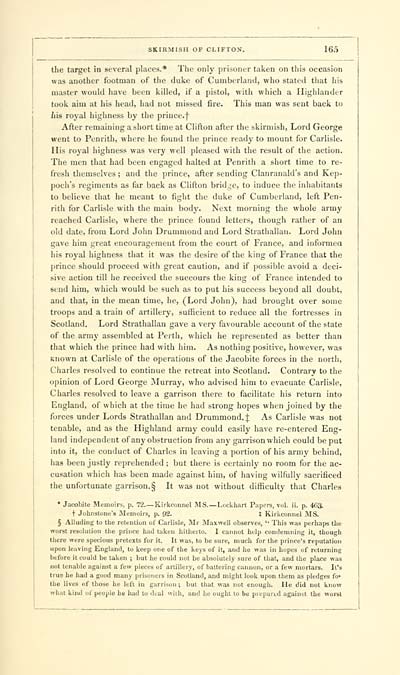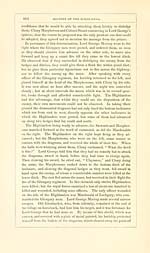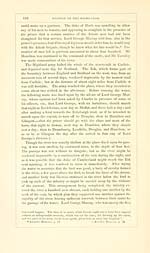Download files
Complete book:
Individual page:
Thumbnail gallery: Grid view | List view

SKIRMISH OF CLIFTON. 165
the target in several places.* The only prisoner taken on this occasion
was another footman of tlie dulie of Cumberland, who stated that liis
master would have been killed, if a pistol, witli which a Iligldander
took aim at liis head, had not missed fire. Tiiis man was sent back to
his royal highness by the princo.f
After remaining a short time at Clifton after the skirmish, Lord George
went to Penrith, where he found the prince ready to mount for Carlisle.
His royal highness was very well pleased with the result of the action.
The men that had been engaged halted at Penrith a short time to re-
fresh themselves ; and the prince, after sending Clanranald's and Kep-
poch's regiments as far back as Clifton bridge, to induce the inhabitants
to believe that he meant to fight the duke of Cumberland, left Pen-
rith for Carlisle with the main body. Next morning the whole army
reached Carlisle, where the prince found letters, though rather of an
old date, from Lord John Drummond and Lord Strathallan. Lord John
gave him great encouragement from the court of France, and informea
his royal highness that it was the desire of the king of France that the
prince should proceed with great caution, and if possible avoid a deci-
sive action till he received the succours the king of France intended to
send him, which would be such as to put his success beyond all doubt,
and that, in the mean time, he, (Lord John), had brought over some
troops and a train of artillery, sufficient to reduce all the fortresses in
Scotland. Lord Strathallan gave a very favourable account of the state
of the army assembled at Perth, which he represented as better than
that which the prince had with him. As nothing positive, however, was
Known at Carlisle of the operations of the Jacobite forces in the north,
Charles resolved to continue the retreat into Scotland. Contrary to the
opinion of Lord George Murray, who advised him to evacuate Carlisle,
Charles resolved to leave a garrison there to facilitate his return into
England, of which at the time he had strong hopes when joined by the
forces under Lords Strathallan and Drummond. J As Carlisle was not
tenable, and as the Highland army could easily have re-entered Eng-
land independent of any obstruction from any garrison which could be put
into it, the conduct of Charles in leaving a portion of his army behind,
has been justly reprehended ; but there is certainly no room for the ac-
cusation which has been made against him, of having wilfully sacrificed
the unfortunate garrison.§ It was not without difficulty that Charles
• Jacobite Memoirs, p. 72 — Kirkconnel MS. — Loclihart Papers, vol. ii. p. 463.
+ Johnslone's Memoire, p. 92. % Kirkconiiel MS.
§ Alluding to the retention of Carlisle, Mr Maxwell observes, *' This was perhaps the
worst resolution the prince had taken hitherto. I cannot help condemning it, though
there were specious pretexts for it. It was, to be sure, much for the prince's reputation
upon leaving England, to keep one of the keys of it, and he was in hopes of returning
before it could be taken ; but he could not be absolutely sure of that, and the place was
not tenable against a few pieces of artillery, of battering cannon, or a few mortars. It's
true he had a good many prisoners in Scotland, and might look upon them as pledges fo>
the lives of those he left in garrison ; but that n:;s not enough. He did not know
what kind of people he had to deal with, and he ought to be prepared against the worst
the target in several places.* The only prisoner taken on this occasion
was another footman of tlie dulie of Cumberland, who stated that liis
master would have been killed, if a pistol, witli which a Iligldander
took aim at liis head, had not missed fire. Tiiis man was sent back to
his royal highness by the princo.f
After remaining a short time at Clifton after the skirmish, Lord George
went to Penrith, where he found the prince ready to mount for Carlisle.
His royal highness was very well pleased with the result of the action.
The men that had been engaged halted at Penrith a short time to re-
fresh themselves ; and the prince, after sending Clanranald's and Kep-
poch's regiments as far back as Clifton bridge, to induce the inhabitants
to believe that he meant to fight the duke of Cumberland, left Pen-
rith for Carlisle with the main body. Next morning the whole army
reached Carlisle, where the prince found letters, though rather of an
old date, from Lord John Drummond and Lord Strathallan. Lord John
gave him great encouragement from the court of France, and informea
his royal highness that it was the desire of the king of France that the
prince should proceed with great caution, and if possible avoid a deci-
sive action till he received the succours the king of France intended to
send him, which would be such as to put his success beyond all doubt,
and that, in the mean time, he, (Lord John), had brought over some
troops and a train of artillery, sufficient to reduce all the fortresses in
Scotland. Lord Strathallan gave a very favourable account of the state
of the army assembled at Perth, which he represented as better than
that which the prince had with him. As nothing positive, however, was
Known at Carlisle of the operations of the Jacobite forces in the north,
Charles resolved to continue the retreat into Scotland. Contrary to the
opinion of Lord George Murray, who advised him to evacuate Carlisle,
Charles resolved to leave a garrison there to facilitate his return into
England, of which at the time he had strong hopes when joined by the
forces under Lords Strathallan and Drummond. J As Carlisle was not
tenable, and as the Highland army could easily have re-entered Eng-
land independent of any obstruction from any garrison which could be put
into it, the conduct of Charles in leaving a portion of his army behind,
has been justly reprehended ; but there is certainly no room for the ac-
cusation which has been made against him, of having wilfully sacrificed
the unfortunate garrison.§ It was not without difficulty that Charles
• Jacobite Memoirs, p. 72 — Kirkconnel MS. — Loclihart Papers, vol. ii. p. 463.
+ Johnslone's Memoire, p. 92. % Kirkconiiel MS.
§ Alluding to the retention of Carlisle, Mr Maxwell observes, *' This was perhaps the
worst resolution the prince had taken hitherto. I cannot help condemning it, though
there were specious pretexts for it. It was, to be sure, much for the prince's reputation
upon leaving England, to keep one of the keys of it, and he was in hopes of returning
before it could be taken ; but he could not be absolutely sure of that, and the place was
not tenable against a few pieces of artillery, of battering cannon, or a few mortars. It's
true he had a good many prisoners in Scotland, and might look upon them as pledges fo>
the lives of those he left in garrison ; but that n:;s not enough. He did not know
what kind of people he had to deal with, and he ought to be prepared against the worst
Set display mode to: Large image | Transcription
Images and transcriptions on this page, including medium image downloads, may be used under the Creative Commons Attribution 4.0 International Licence unless otherwise stated. ![]()
| Early Gaelic Book Collections > Ossian Collection > History of the Highlands and of the Highland clans > Volume 3 > (195) |
|---|
| Permanent URL | https://digital.nls.uk/79654762 |
|---|
| Description | Vol. III. |
|---|---|
| Shelfmark | Oss.249 |
| Attribution and copyright: |
|
| Description | Selected books from the Ossian Collection of 327 volumes, originally assembled by J. Norman Methven of Perth. Different editions and translations of James MacPherson's epic poem 'Ossian', some with a map of the 'Kingdom of Connor'. Also secondary material relating to Ossianic poetry and the Ossian controversy. |
|---|
| Description | Selected items from five 'Special and Named Printed Collections'. Includes books in Gaelic and other Celtic languages, works about the Gaels, their languages, literature, culture and history. |
|---|

